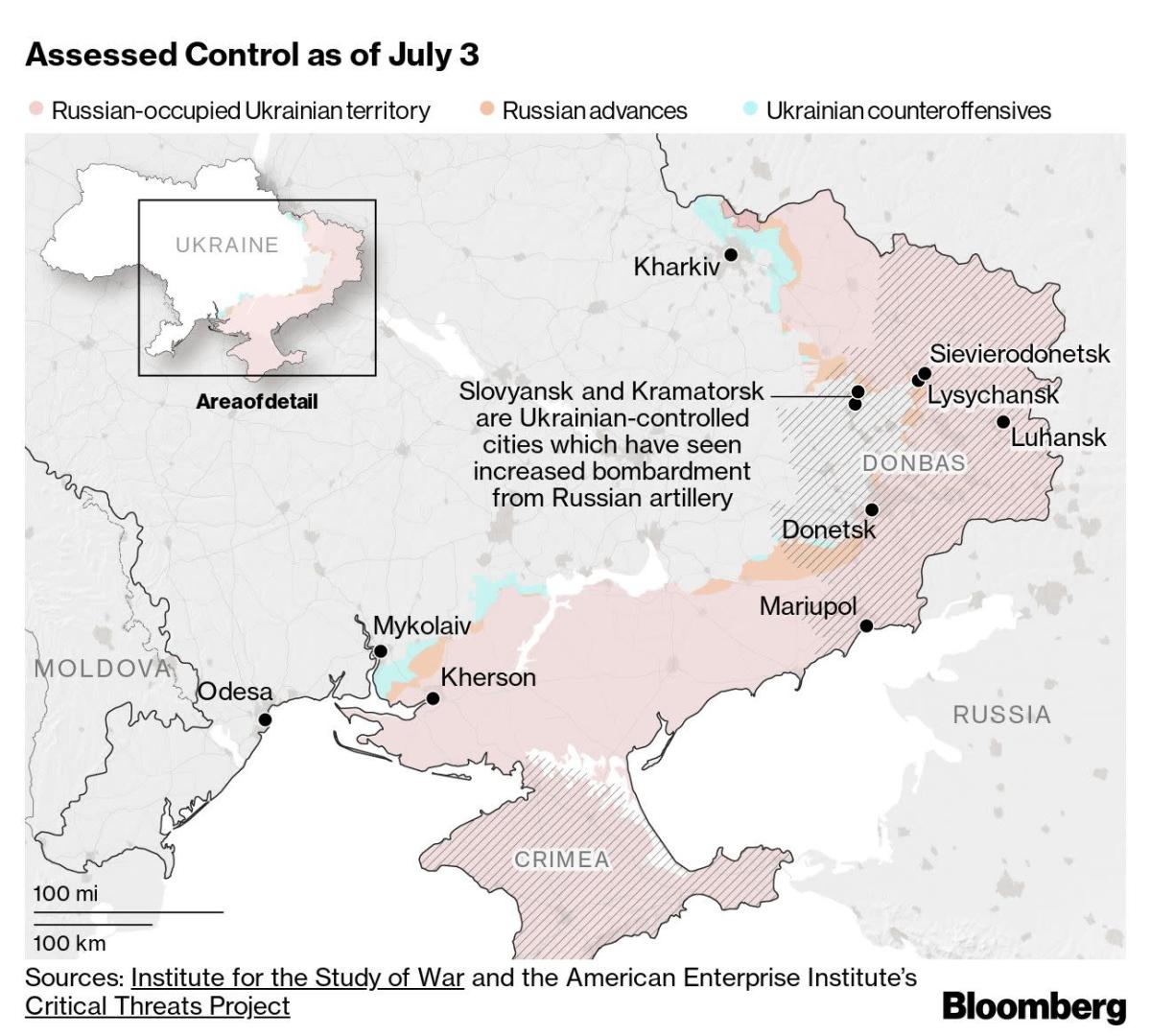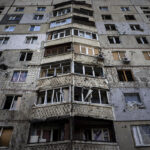
(Bloomberg) — The US and its allies have discussed trying to cap the price on Russian oil as a way to curb the Kremlin’s revenue, as German Chancellor Olaf Scholz accused Vladimir Putin of using energy as a political weapon.
Most Read from Bloomberg
The risk of potential disruption from Russia prompted a continued rally in European natural gas, which was headed for the longest stretch of daily gains in more than nine months. Germany, Europe’s largest economy, braced as the Nord Stream 1 pipeline — the main conduit to the continent — is set to close next week for annual maintenance, with speculation emerging that it won’t return to full service.
Elsewhere, foreign ministers from the Group of 20 nations began arriving for a two-day meeting in Bali where Russia’s war is expected to dominate discussions. Ukraine summoned the Turkish ambassador, citing an “unacceptable situation” after authorities in Turkey released a Russian vessel that Kyiv said was shipping grain seized from an occupied port.
(See RSAN on the Bloomberg Terminal for the Russian Sanctions Dashboard.)
Key Developments
-
Germany’s Habeck Urges Canada to Help Thwart Putin’s Gas Excuses
-
Ukraine War Short-Circuits Europe’s Clean Energy Aspirations
-
US, Allies Discuss Capping Russian Oil Price at $40-$60 a Barrel
-
Scholz Accuses Putin of Using Natural Gas Deliveries As Weapon
-
Russia’s War-Weary Tech Talent Floods Into Neighboring Georgia
-
Russia Dodges Worst Recession Fears as Oil Eases Sanctions Pain
On the Ground
Russia twice attacked the Odesa region with missiles overnight, destroying two agricultural hangars and hitting Snake Island, a strategic outpost off the Black Sea coast, local authorities said on Telegram. In the east, Russian troops attempted to conduct assaults in Slovyansk in the Donetsk region, and to establish full control over Luhansk, Ukraine’s General Staff said in its morning update. The Institute for the Study of War said there were no claimed or assessed Russian territorial gains in Ukraine on Wednesday for the first time in 133 days of war.
(All times CET)
Ukraine Summons Turkish Ambassador Over Released Russian Vessel (11:02 a.m.)
Ukraine summoned the Turkish ambassador, citing an “unacceptable situation” after authorities in Turkey released a Russian vessel that Kyiv said was shipping grain seized from the Ukrainian port of Berdyansk.
“The Ukrainian side has received this information with deep disappointment,” the Foreign Ministry said in a statement on Thursday, calling for an investigation and a “comprehensive answer” to the events.
Germany’s Habeck Urges Canada to Release Turbine (10:31 a.m.)
German Vice Chancellor Robert Habeck made a public plea to Canada to release a turbine that’s caught up in sanctions against Russia and critical for gas flows. He said the equipment for the Nord Stream 1 pipeline needs to be returned before maintenance work begins on Monday — eliminating an excuse for Putin to keep the conduit closed.
“I’ll be the first one who will fight for a further strong EU sanction package, but strong sanctions means it must hurt and harm Russia and Putin more than it does our economy,” Habeck told Bloomberg. “Therefore, I ask for understanding that we have to take this turbine excuse away from Putin.”
Romania Reopens Soviet-Era Rail Line to Aid Ukraine Grain Sales (9:53 a.m.)
Romania reopened a Soviet-era rail link connecting its Danube River port of Galati to Ukraine a month earlier than expected to help boost vital grain exports from its neighbor. Ukraine grain exports, blocked from leaving key Black Sea ports, have been confined to road, river and rail routes to European countries, with shipments well below the normal pace.
European Gas Extends Rally as Supply Crunch Haunts Market (8:55 a.m.)
Natural gas in Europe headed for the longest stretch of daily gains in more than nine months as persistent fears of deeper supply cuts by Moscow spread through the market.
Benchmark futures, which have doubled their value over the past month, rose as much as 4.7% for a seventh day of increases. The crisis has also sent power prices to record highs as Russia’s tightening hold on energy supplies brings the risk that Europe may struggle to keep the heat and lights on this winter.
Ukraine War Short-Circuits Europe’s Clean Energy Plan (6:12 a.m.)
Putin’s invasion of Ukraine has forced several countries to backpedal on the European Union’s “Fit for 55” plan for decarbonization, to compensate for cuts in Russian fuel supplies. European countries have burned more coal, planned new liquefied natural gas terminals, and extended the region’s network of gas pipelines since February.
The climate plan announced last July by the European Commission proposed tightening its existing cap-and-trade system for carbon emission permits, ramping up renewable power, and phasing out cars with internal combustion engines to slash emissions by 55% by 2030 from 1990 levels. The war in Ukraine has highlighted the degree to which those ambitions relied on gas piped from Russia.
Scholz Accuses Putin of Using Gas Deliveries as Weapon (8:30 p.m.)
The remarks from the German chancellor come as his country faces the prospects of further cuts in gas flows, with the Nord Stream pipeline, the main gas conduit to Europe, set to close for maintenance next week. Concerns are mounting that the pipeline won’t return to full service after the work.
“Germany has relied for too long and too one-sidedly on energy deliveries from Russia,” Scholz said at an event of the BEE renewable energy business association in Berlin. “Today we have to admit: Russia uses energy as a weapon. No one actually believes that Russia is reducing its gas supplies for technical reasons alone,” Scholz added.
Read more: Scholz Accuses Putin of Using Natural Gas Deliveries As Weapon
US and Allies Discuss Capping Russian Oil Prices at $40-$60 (5:40 p.m.)
The US and its partners have been exploring ways to limit Russian oil revenues while minimizing the impact on their own economies. The range spans from what is believed to be Russia’s marginal cost of production and the price of its oil before the Feb. 24 invasion.
A more specific threshold would depend on market conditions when a cap is agreed and those could change significantly. The aim is to cut Moscow’s revenue for its war in Ukraine but the risk is that poorly executed measures would lead to a spike in oil prices.
Read more: US, Allies Discuss Capping Russian Oil Price at $40-$60 a Barrel
Most Read from Bloomberg Businessweek
©2022 Bloomberg L.P.




